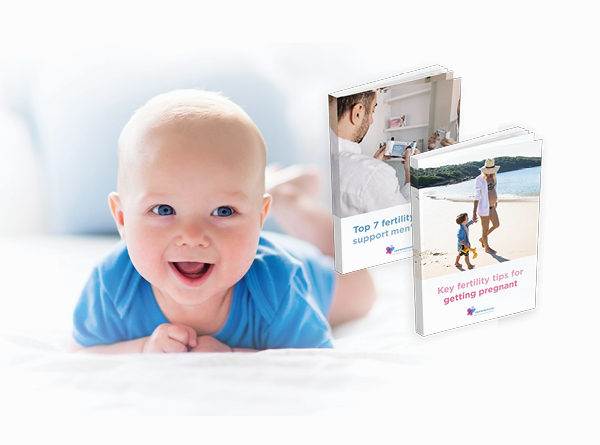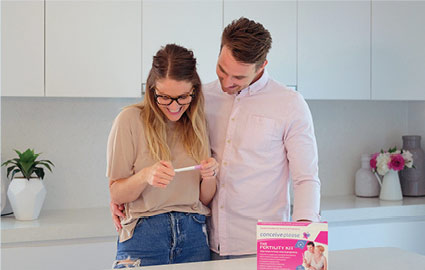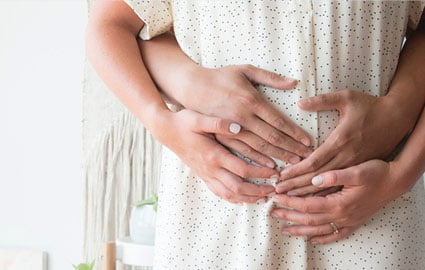When is your fertile window? And can you get pregnant during your period? These are some of the most common questions women have when it comes to talking fertility. Here’s a guide to help you understand your fertile window and ways to tune into your body’s signs of ovulation.
What is a fertile window?
A woman’s fertile window opens during the ovulation stage of her reproductive cycle. Ovulation occurs around the middle of the menstrual cycle, and it starts from the moment when the pituitary gland releases a surge of leutenizing hormone (LH), propelling an egg from the ovary and into the fallopian tube to be fertilised by a sperm cell.
When is the fertile window?
If you’re asking, ‘When is my fertile window?’, the answer is a little more complex than simply listing some fixed dates. If an average reproductive cycle length is 28 days, then 14 days into the menstrual cycle is ovulation. That said, every women is different and menstrual cycles can vary between months causing many couples to miss the fertile window by having intercourse at the wrong time.
In short, determining exactly when is the fertile window can be hit and miss if you’re relying on guesswork, which can make things stressful for you and your partner. Carefully tracking your ovulation using more than one method is the best way to pinpoint your fertile time, giving you and your partner peace of mind that you have not missed the opportunity. Because ovulation is triggered by the luteinising hormone (LH), detecting the surge in your urine with our easy-to-use conceiveplease™ One Step LH Urine Ovulation Test is the most effective way of determining the time of ovulation.
There are a couple of other methods to help monitor your ovulation, and all of them combined will best help you determine your fertile window accurately, and therefore increase your chances of conceiving naturally. Some other methods include:
- Measuring the basal body temperature: Your basal body temperature increases slightly at the time of ovulation.
- Mid-cycle ovulation pain, called ‘Mittelschmerz’
- A heightened sense of smell and taste
- Increased libido
- Tender breasts
How to get pregnant during your fertile window
So, you’ve got the tracking tools to help monitor your fertile window, then comes the next big consideration: how to get pregnant during fertile window. We don’t mean how it’s done - you and your partner have that covered! Understanding how to fall pregnant means thinking about the frequency of intimacy with your partner and taking into consideration any lifestyle factors that may inhibit your fertility in some way. When it comes to the frequency at which you and your partner have sex, the more you have during your fertile window, the better your chances of conceiving. When planning for a baby, it’s important for you and your partner to sit down and evaluate the following lifestyle factors as well:
- Diet and exercise - a poor diet and infrequent exercise can affect fertility
- Alcohol intake and smoking - to maximise your chances of conception, the best option is to avoid both when trying for a baby as well as during your pregnancy
Be patient with the conception process
For some couples, it is normal to take up to two years to get pregnant. It may feel far from normal if it's happening to you, but it doesn't necessarily mean you have a fertility problem. In general, a fertile couple has a good chance of getting pregnant within a year, as out of 100 couples trying to conceive naturally:
- 20 will conceive within one month
- 70 will conceive within six months
- 85 will conceive within one year
- 90 will conceive within 18 months
- 95 will conceive within two years
About half of the couples who don't get pregnant within a year will conceive the following year, if they keep trying. If you and your partner have been trying to conceive for 12 months or longer and you have concerns it is recommended that you seek fertility advice from a doctor or fertility specialist.
Your pregnancy journey
Preparing for pregnancy
A good preconception plan to educate yourself about your fertility cycle and implementing recommended lifestyle changes optimises your chances of conceiving naturally.
Monitoring ovulation
In order to pinpoint your fertile window, you need to be aware of the length of your menstrual cycle. The average length of menstruation is 28 days.
During pregnancy
The female body will evolve dramatically within this time and there are many nutritional and lifestyle changes that will be necessary to meet the needs of a growing healthy foetus.
Download your FREE e-books for top fertility tips to help you get pregnant





